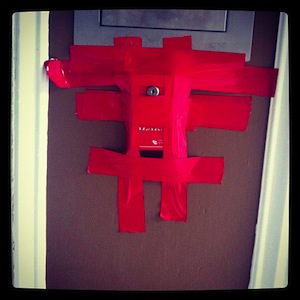Is There Really a Terrorist Threat?
"It is more plausible to look upon the embassy closures and the official accounts thereof as political theater and insulting, cynical manipulation than it is to accept them at face value," author Patrick Smith writes at Salon.
“Nothing can be said for certain as to what prompted the State Department to close more than 20 embassies and consulates in the Middle East and North Africa last Sunday,” writes author Patrick Smith at Salon. “But it is no excuse not to raise the possibility that Americans are eating a summer salad of nonsense served to justify objectionable surveillance practices now coming in for scrutiny.”
Are the terrorist threats recently waved in Americans’ faces in recent days a load of hoo-hah? We’ve seen this show before. The powers that be want to expand their power, so we’re told that some form of revenue expenditure amounting to an increase in security activities is necessary. The mainstream press goes along with it and many Americans are awed. Later we learn we were told lies.
The American people have no way of telling exactly what is going on this time around, but as Smith writes, the prospect of another smoke and mirrors power grab “seems so self-evident that one feels almost silly raising it, except that so few have.” To him, “the silence among our newspapers and broadcasters on this point confirms only how dangerously circumscribed American political discourse has become. It is all text and subtext now, and the subtext, by definition, is known but never allowed to pierce the surface of silence.”
The consequence for the public is a reversion to a posture of paranoia. We have plenty of analogues in 20th century history. Take “the late winter of 1947 — March 12,” for example. “That is the day Harry Truman began the Cold War, by the reckoning of many (not all) scholars. Truman wanted to send $400 million to the Greek monarchy to suppress a popular, mixed-bag rebellion. But would a stingy, isolationist Congress buy into this momentous move? The American public was in no mood, either. (In the bargain, the monarchy in Athens was crypto-fascist even by the accounts of State Department diplomats.)”
“Truman found a friend in the chairman of the Senate Foreign Relations Committee, Republican Arthur Vandenberg, who delivered a line long famous among Cold War historians. Come to the Hill, Vandenberg urged. ‘Make a personal appearance before Congress and scare the hell out of the American people.’ Truman did, Congress clapped, the Greeks got the military aid, and Americans got desirably scared. So ensued the wastage of the next 42 years.”
Zoom forward to the present. In the case of the recent embassy closures, Smith insists that “it is more plausible” to look upon that scare “and the official accounts thereof as political theater and insulting, cynical manipulation than it is to accept them at face value.”
“The Cold War was a dread, if we ever get around to looking at it squarely. And we are at it again, the nation that seems to know itself only by way of a constant enemy. It is so uncannily the same: another gross corruption of democratic principle even as we have not recovered from the last one, another squandering of our time as the world moves on.”
When President Obama spoke at the National Defense University in May, he said that the war on terror, “like other wars, must end… “That is what history advises. That is what our democracy demands.” And as for al-Qaida, he had decapitated it with the assassination of Osama bin Laden. The president proudly told us the group was “on the run.” The defense establishment was doing its job, and we could soon put our guns back into their cases and get back to the businesses of building society and enjoying life.
But now, shortly after a wave of revelations of the true nature of American “security” operations, “we find that al-Qaida was not on the run after all.” Instead “it has fragmented, and this is where all the [new] ‘affiliates’ come in. There are said to be enough affiliates to keep the NSA supplied for years. In this case, intelligence picked up a telephone conversation (those incautious Islamists) between a powerful giver of orders in Pakistan — from the decapitated, fragmented al-Qaida — and an underling in an affiliate in Yemen. The alleged command was to attack.”
“The rest is smoke,” Smith writes. “No what, no when, no where.” Of course it is. Americans do not need to know what their government is doing in their name against the country’s alleged enemies. The reason for that could very probably be that in a society set to deteriorate ever more rapidly under the strain of converging and lasting environmental and economic crises, matters of social control require that a public as legitimately dissatisfied as the “terrorist enemies” that decades of aggressive foreign policy have created across the globe be regarded as a potential enemy as well.
— Posted by Alexander Reed Kelly.
Your support matters…Independent journalism is under threat and overshadowed by heavily funded mainstream media.
You can help level the playing field. Become a member.
Your tax-deductible contribution keeps us digging beneath the headlines to give you thought-provoking, investigative reporting and analysis that unearths what's really happening- without compromise.
Give today to support our courageous, independent journalists.






You need to be a supporter to comment.
There are currently no responses to this article.
Be the first to respond.